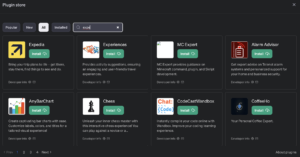The ecommerce industry is not just surviving; it’s thriving. With global ecommerce sales expected to reach $6 trillion by 2024, the market is more lucrative than ever. However, this growth comes with its own set of challenges. As the industry expands, so does the complexity of online business management. From customer experience to data analytics, ecommerce companies grapple with issues requiring innovative solutions. The stakes are high, and the room for error is minimal. In such a competitive environment, staying ahead of the curve is not just an advantage; it’s a necessity.
TABLE OF CONTENTS
- The rise of AI in ecommerce
- The importance of OpenAI plugins (and GPTs)
- Challenges in modern ecommerce
- Why traditional solutions are no longer enough
- 3 examples of OpenAI plugins changing ecommerce ecosystems
- Bonus: Your own GPT for product description generation
- Key takeaways
- How Vaimo can help
The Rise of AI in ecommerce
Artificial Intelligence (AI) has moved from the realm of science fiction to being a business imperative. In ecommerce, AI is being used for everything from customer service bots to predictive analytics. According to a report by Forbes, companies that integrate AI expect to see an annual growth rate of 37.3% between 2023 and 2030. The technology is revolutionizing various aspects of ecommerce, making operations more efficient, enhancing the customer experience, and even automating mundane tasks.
The Importance of OpenAI Plugins
OpenAI plugins disrupted the digital landscape when they were released in May 2023. Integrating seamlessly with existing ecommerce platforms through ChatGPT, they pushed the boundaries one step further. But last month, OpenAI took it one step closer to a dystopian future: the release of GPTs. The concept is simple: building your own, dedicated version of ChatGPT, specifically built to run a particular task. Do you need a copywriter assistant? Done. Do you require a Data Analysis copilot? Here you go.

Rolled out to Plus users (the Premium plan of ChatGPT) in late October 2023, GPTs are OpenAI plugins on steroids. And yes, you can also embed them on your website!
According to AIBusiness, by 2025, AI will power 95% of customer interactions in ecommerce. OpenAI plugins (and GPTs) will be at the forefront of this revolution, offering scalable and efficient solutions for complex problems.
NB: If you’re using ChatGPT for your ecommerce, you should take a look at the end of this article
Challenges in modern ecommerce
Data overload
In the age of Big Data, information is abundant, but insights are scarce. Ecommerce businesses have access to a plethora of data—customer behavior, sales metrics, market trends, and more. However, the sheer volume of this data can be overwhelming. According to a study by Forrester, only 29% of businesses can turn data into actionable insights. This leads to what experts call “analysis paralysis,” where information overload hampers decision-making.
Customer experience gaps
The modern consumer is spoilt for choice. With numerous options at their fingertips, customers have become more demanding than ever. They expect personalized, seamless experiences across all touchpoints. However, delivering this level of personalization is easier said than done. According to a report by Accenture, 91% of consumers are more likely to shop with brands that provide personalized offers and recommendations. Yet, many ecommerce businesses struggle with this, leading to customer dissatisfaction and, ultimately, a loss of revenue.
Operational inefficiencies
Time is money, and in ecommerce, operational inefficiencies can cost you both. Whether it’s slow website load times, cumbersome inventory management, or outdated payment gateways, these inefficiencies can significantly drain resources. According to a study by the Baymard Institute, the average cart abandonment rate is around 70%, often due to a slow or complicated checkout process. These operational bottlenecks not only affect the bottom line but also erode customer trust.
Why traditional solutions are no longer enough
Limitations of manual data analysis
In an era where data is the new oil, traditional data analysis methods are becoming increasingly obsolete. Manual data analysis is not only time-consuming but also prone to human error. Even with the best analytics tools, the human element can be a bottleneck in deriving actionable insights. According to a report by Forbes, only 59% of companies are currently using data in a way that improves organizational performance. This is a startling statistic, considering the vast amounts of data that businesses accumulate. The limitations of manual data analysis are not just a hindrance; they’re a significant setback in a world that’s moving towards automation.
The cost of poor customer experience
Customer experience is the cornerstone of any successful ecommerce business. However, the cost of failing to meet customer expectations is higher than ever. A single bad experience can lead to a lost customer, negative reviews, and even brand erosion. According to a study by PwC, one in three consumers will leave a brand they love after just one bad experience. In the age of social media, where word-of-mouth travels faster than ever, the repercussions of poor customer experience can be devastating.
The inefficacy of legacy systems
Many ecommerce platforms are built on outdated technology that can’t keep up with the demands of modern business. These legacy systems are inefficient and lack the flexibility to integrate new technologies easily. According to a report by Gartner, 90% of current applications will still be in use by 2023, but most will receive insufficient modernization investment. This creates a vicious cycle where businesses are stuck with outdated systems that hinder growth and innovation.
3 examples of OpenAI plugins changing ecommerce ecosystems
Natural language processing for enhanced search and customer service
Natural Language Processing (NLP) is a cornerstone of modern AI applications, and its implications for ecommerce are vast. From enhancing search functionalities to powering customer service chatbots, NLP can significantly improve user experience. Imagine a customer service that understands keywords and the sentiment and context behind user queries. The result is a more personalized, efficient, and satisfying user experience.
NLP at Expedia
Expedia, one of the world’s most popular travel-planning platforms, has integrated conversational AI into its services. With a dedicated ChatGPT extension, customers can now plan vacations as if they were chatting with a knowledgeable travel agent. The app even creates smart lists of hotels and attractions based on customer interest. The company uses advanced NLP algorithms to understand user intent and context. This enables the platform to generate smart lists and offer personalized recommendations, enhancing the overall customer experience. The good part? The plugin is available publicly in the ChatGPT plugin library, which means that it can be accessed directly from OpenAI solution, or embedded into your website.

Personalized marketing campaigns
Artificial Intelligence (AI) is revolutionizing the advertising sector by enabling the creation of innovative and highly targeted ad campaigns. AI algorithms are adept at processing extensive consumer data, leading to personalized and optimized advertizing strategies. This shift towards AI-driven advertizing allows for the generation of diverse content at scale, significantly enhancing the efficiency and effectiveness of ad campaigns.
AI-generated advertizing campaign for Heinz
One of the most notable examples of AI’s application in advertizing is Heinz’s campaign, executed in partnership with Rethink Ideas, which utilized visuals generated entirely by AI. This campaign leveraged the AI image generator DALL-E 2, which produced images reminiscent of Heinz ketchup bottles when prompted with ketchup-related scenarios. The campaign garnered attention for its novel use of AI in creative advertising, although specific performance metrics were not publicly shared.

Dynamic pricing strategies
Dynamic pricing is not a new concept, but its implementation has been revolutionized by AI. OpenAI plugins can adjust pricing in real time based on a multitude of factors such as demand, competitor pricing, and market conditions. This allows ecommerce businesses to maximize profits while ensuring customer satisfaction.
Dynamic pricing for Amazon
Amazon effectively uses AI-powered dynamic pricing. They employ sophisticated algorithms to analyze customer browsing histories, buying patterns, and competitor prices. This enables them to dynamically adjust prices in real-time, allowing them to maximize profitability and maintain a competitive advantage, particularly during events such as Black Friday.
Bonus: Your own GPT for product description generation
By now, you probably understand the power of OpenAI plugins. But because we’re all about empowering companies to leverage AI in their tech stacks, we’ve been developing a dedicated GPT just for you: the Vaimo – Ecom Product Description Generator 🤖

How to use it in three simple steps:
1️⃣ Copy/paste your product URL into the chat bar
2️⃣ Click “Enter”.
3️⃣ Let the magic begin
Bear in mind that you will only be able to access this GPT if you have an active OpenAI Plus plan.
Key takeaways
The ecommerce landscape is evolving at an unprecedented pace, and businesses that fail to adapt risk falling behind. OpenAI’s plugins and GPTs offer a transformative solution to many challenges plaguing modern ecommerce. From natural language processing to dynamic pricing strategies, these tools are set to revolutionize the industry.
The real-world examples and case studies highlighted in this blog post serve as a testament to the transformative potential of OpenAI plugins and the latest GPTs feature. For decision-makers, the message is clear: understanding and adopting OpenAI tools (or similar ones) is not an option; it’s necessary to stay competitive in this rapidly evolving landscape.
How Vaimo can help
At Vaimo, we firmly believe that AI is here to stay and that it will become a key performance factor for ecommerce companies. In that regard, OpenAI plugins (and the latest GPTs) seem to be the best way to grasp the transformative power of AI beginning today.
That’s why we’re currently developing a dedicated AI entity to empower our partners with the best-in-class AI-powered strategies. One of our favorite ways of applying AI to business is leveraging it to automate content creation, orchestration, and distribution. Our AI-powered content strategy service will provide you with the competitive edge you need to stand out. Boost customer engagement, drive conversions, and maximize ROI with data-driven insights and automation.
If you’re ready to take your business to the next level and also believe AI is meant to empower companies (and not destroy them), you might consider reaching out to our experts. Together, we’ll analyze your unique business needs, discuss your goals, and create a tailored AI-powered content strategy that propels your brand forward.
I want to implement an AI-powered content strategy »
Sources
1 – https://www.statista.com/statistics/379046/worldwide-retail-e-commerce-sales/
2 – https://www.forbes.com/advisor/business/ai-statistics/
3 – https://aibusiness.com/automation/ai-will-power-95-of-customer-interactions-by-2025
4 – https://newsroom.accenture.com/news/widening-gap-between-consumer-expectations-and-reality-in-personalization-signals-warning-for-brands-accenture-interactive-research-finds.htm
5 – https://baymard.com/lists/cart-abandonment-rate
6 – https://www.majesteye.com/why-is-data-important-for-your-business/
7 – https://www.pwc.com/us/en/services/consulting/library/consumer-intelligence-series/future-of-customer-experience.html
8 – https://www.castsoftware.com/pulse/it-modernization-business-case-for-2020-10-tips
9 – https://www.forbes.com/sites/bernardmarr/2023/05/30/10-amazing-real-world-examples-of-how-companies-are-using-chatgpt-in-2023/?sh=24ab5c8f1441
10 – https://www.linkedin.com/pulse/revolutionsing-pricing-strategies-ai-industry-dr-ari-aaltonen/
11 – https://openai.com/blog/chatgpt-plugins
12 – https://chat.openai.com/g/g-gUReJAJwm-vaimo-ecom-product-description-generator







